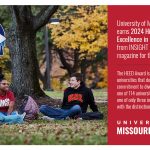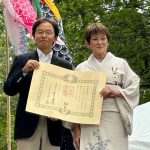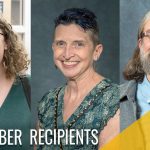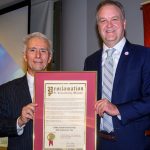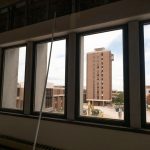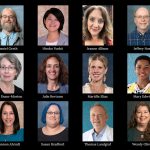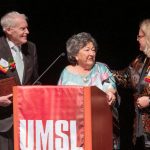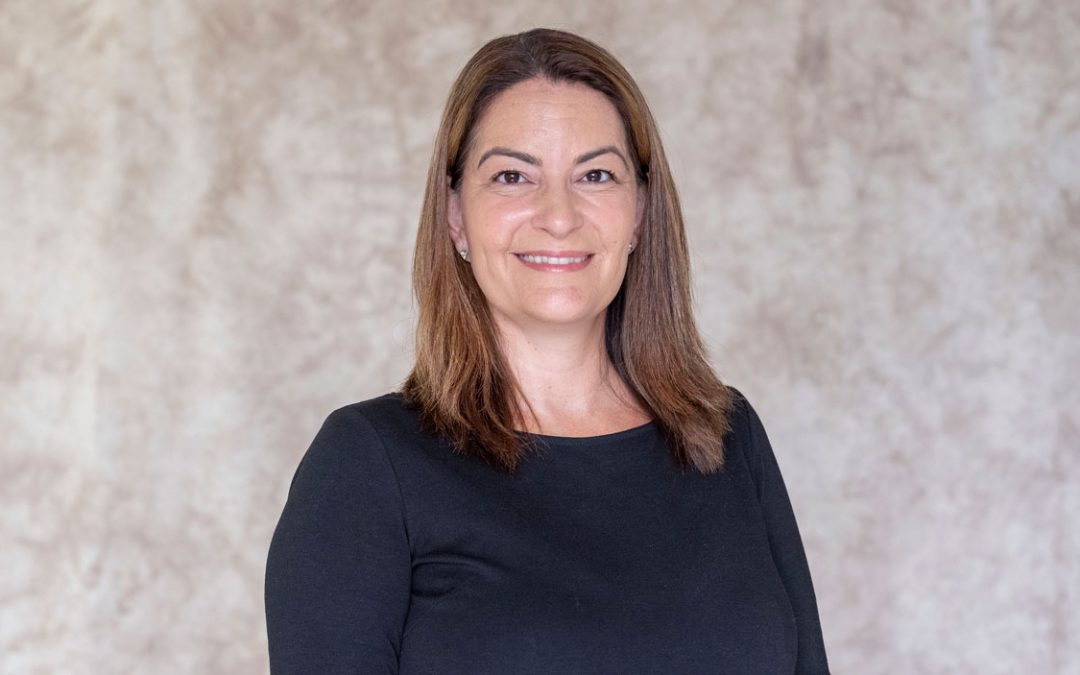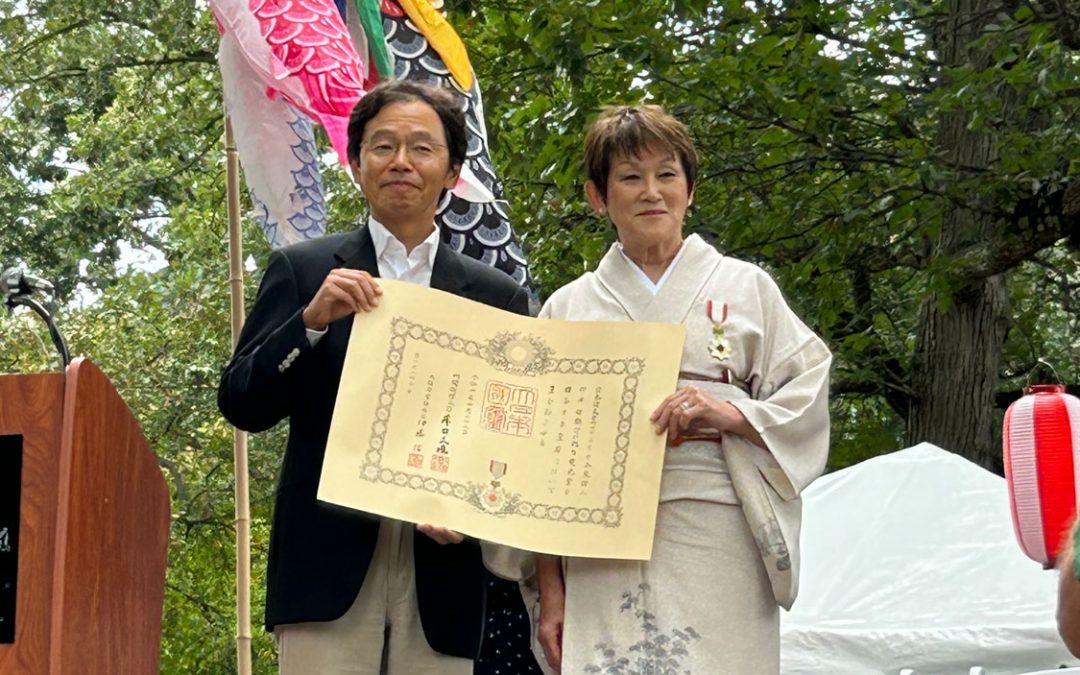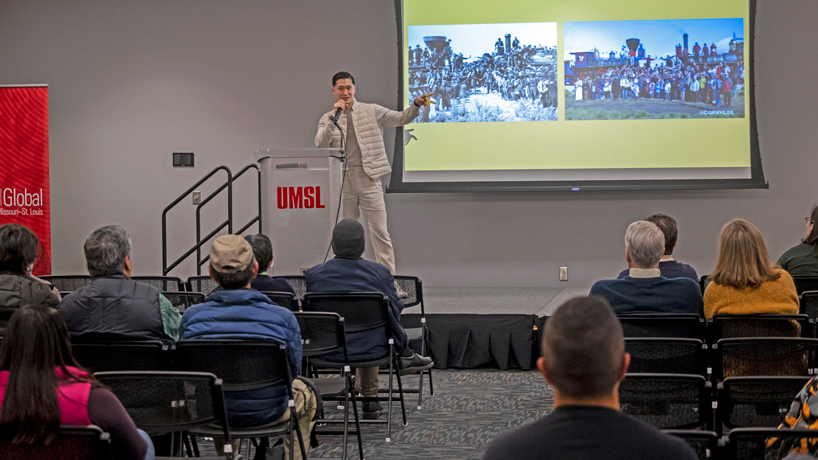
Sam Hyun delivers a talk on “The Invisible Race” on March 23 in the Century Rooms of the Millennium Student Center. (Photo by Steve Walentik)
Fishermen from the Philippines were the first people of Asian origin to immigrate to the United States beginning in the 18th century, and over the next 250-plus years, they would be followed in fits and starts by numerous other migrants hailing from all corners of the continent as well as the Pacific Islands.
The passage of the Hart-Celler Act in 1965, abolished national origin quotas and opened the door for a significant influx of people from China, Japan, Korea, India and other parts of South Asia who settled and built their lives here.
Today, Asian Americans and Pacific Islanders make up about 6.9% of the U.S. population and are the country’s fastest-growing racial demographic group. There are more than 20 million people in the United States who identify as Asian, Native Hawaiian or Pacific Islander, and that number is projected to grow to more than 46 million people by 2060.
Yet despite their history and their numbers, Sam Hyun believes that Asian Americans remain an “invisible race” in the United States – either overlooked or easily stereotyped, with little effort made to understand them in their full complexity.
A noted speaker on issues of diversity, equity and inclusion with more than 230,000 followers on TikTok, Hyun aims to help change that through talks like the one he gave March 23 before an audience of about 50 people in the Century Rooms of the Millennium Student Center at the University of Missouri–St. Louis.
“I urge you to listen to the different voices that are within the Asian American community, the AAPI community, because when you will do that, you enrich yourself in ways that you couldn’t possibly imagine,” Hyun said as he opened the event, sponsored by UMSL Global.
Too often, as Hyun noted, it’s been easier – and in some cases even seen as more preferable – to ignore the AAPI community.
He showed the audience Andrew J. Russell’s famous photo from May 10, 1869, capturing the completion of the first transcontinental railroad in Utah. Roughly 15,000 Chinese workers helped build the western leg of the railroad across the Sierra Nevada mountains, allowing the Union Pacific and Central Pacific lines to connect at Promontory Summit in Utah. But the iconic image from that day contains not a single person of Asian descent.
Typically, little is taught about other parts of AAPI history in schools, aside from maybe a passing mention of Japanese internment during World War II.
If they were cut out of that moment more than 150 years ago and overlooked in the time since, they still often find themselves left out today. Hyun cited a poll published in his hometown of Boston during the 2021 mayoral election, won by Michelle Wu, for whom Hyun now works as the director of federal relations. The poll included voter preferences for whites, Blacks and Latinos, but there was no polling specifically looking at Asian Americans.
“Is it because we’re too small?” Hyun asked, before answering his own question. “No. We’re tied for the third-largest voting bloc in Boston, a city of about 750,000 people. Where are we? Do we not matter? Do we live there? Do we not vote? No, Chinatown votes in droves. Little Saigon votes in droves. Where are we?”
Hyun knows the stereotypes about Asian Americans as a “model minority” that permeate American media – how successful they all are, how they’re so gifted at math and disciplined and driven and don’t ever ruffle feathers. He heard them all as he was growing up, attending Newton South High School and going on to play college baseball at Alleghany College while pursuing his bachelor’s degree in history.
But Hyun, who spent four years as a legislative aid to Massachusetts House Speaker Robert DeLeo and returned to school to earn master’s degrees in public policy and business administration from The Heller School for Social Policy and Management at Brandeis University, knows those stereotypes are often used to pit Asian Americans against other minority groups, and they do a disservice to efforts to confront the complex challenges faced by members of the AAPI community. That community is not monolithic and includes people from 21 countries who speak dozens of different languages.
He noted that only 5.6% of Fortune 500 CEOs are Asian Americans. Too often they don’t have access to top positions of influence.
For all their successes, Asian Americans also have the single largest racial wealth gap in the country. Asian American organizations have received only 0.01% of philanthropic dollars donated in the past 20 years.
There has also been a surge in anti-Asian hate crimes during the COVID-19 pandemic with FBI crime data showing a rise of more than 70%. A survey conducted for the Pew Research Center in 2022 found that most Asian Americans worried about being threatened or attacked and a third said they changed their daily routine because of those concerns.
Students from Asian form the largest group of international students on UMSL’s campus, which is one reason UMSL Global Executive Director Liane Constantine and her team thought it was so important to bring Hyun to campus to lead a talk on these issues.
“I’m really proud and honored to work at a university that takes this topic very seriously and provides room for every group specific discussion,” Constantine said as she introduced Hyun. “Among UMSL’s international students, faculty and staff, population, Asians form the biggest group, and our non-international population on campus has a large number of Asian Americans, who, as a matter of fact, have been wanting to facilitate a discussion like this for a very long time.”
Senior information systems major Georgeann McLemore was among the UMSL students in attendance.
“As someone who is not Asian, I felt it was important to come to learn more about what the Asian American community is currently going through, but also to learn how I can help as an ally to the community,” she said. “I asked ‘How can we help without overstepping?’ and he mentioned ‘Sometimes you have to in order to help amplify their voices and message.’ I liked that because sometimes I find that when it comes to certain movements that center people who are Black, POC or Queer, oftentimes you see people at the forefront of these movements who are not a part of said community.”
The event didn’t just draw members of the campus community. Peter Tao, a member of the board of St. Louis chapter of OCA – Asian Pacific American Advocates, said it was inspiring to hear from Hyun.
“The AAPI community has a long history in this country, but AAPI awareness is lacking, particularly in the understanding of its complexities and diversity,” Tao said. “Sam Hyun presented a great overview and insights in an easy to understand format, capturing these complexities and diversities and dispelling the perception that AAPIs are a homogenous group and should not be referenced as a ‘Model Minority.’”
Hyun left audience members with some suggestions on what they could do to help address these issues. He implored them not to be bystanders and to speak up when they see injustice; to educate themselves about the complexities of the AAPI community; and show up in support.
“The best way that all of us as a whole, as a collective, can heal from all this pain and trauma that we’re experiencing is by listening with intention,” Hyun said. “Whether you’re Asian, you’re Black, you’re Latino, you’re white, wherever you are in the world, so many of us feel like we’re not being seen, we’re not being heard and we’re not being understood. That frustration of feeling invalidated is overwhelming right now. We’re seeing that in society. You see that happening on the streets. You see that happening online. You see that happening within the relationships in our communities. Everybody just feels frustrated and pent up anger.
“But imagine when someone listens to you and hears you out, and you feel that level of understanding. ‘Wow, that person listened to me.’ ‘Wow, that person took the time to actually care about my issues.’ That creates the opportunity for us to build new relationships to grow to heal together, which is going to be so critically important to building that better future together.”



